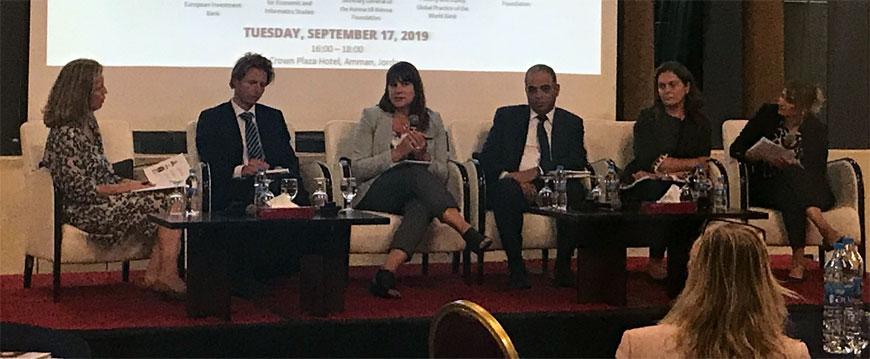You are here
Webinar discusses climate, gender and conflict nexus
By Mays Ibrahim Mustafa - Jun 18,2022 - Last updated at Jun 18,2022
AMMAN — In the third online session of the webinar series on the gender and climate change nexus, organised by Kvinna till Kvinna, an international foundation that supports women’s rights in over 20 conflict-inflicted countries, and Oxfam International, speakers discussed the intersections between climate change, conflict and sustainable peace.
“Women’s heightened vulnerability to climate-fragility risks and threatens to reverse the hard-earned gender gains in the MENA region,” Kvinna’s Acting Regional Manager Rebecca Sonntag said in a statement sent to The Jordan Times.
“There is no shortage of evidence that climate change is incredibly gendered, as it increases women’s existing difficulties in accessing assets and resources,” Oxfam MENA Regional Director Sally Abi Khalil said.
Policy Adviser at Oxfam Novib Simone Van Slooten said that women are the most vulnerable to the effects of climate change and conflict. She noted that displaced women “face a greater risk of gender based violence” and refugee girls are half as likely to enrol in school as their male peers.
She also pointed out that women are not just “victims” of conflict or climate threats; they have “agency”.
According to Slooten, it is important to break down barriers to ensure inclusive participation because women have enough “knowledge and experiences” to take an active part in discussions and come up with solutions.
Environmental Focal Point at the Women’s International League for Peace and Freedom (WILPF) Katrin Geyerspoke on the structures that significantly contribute to this “ecological crisis”. She focused on militarism, which is “interdependent on and reinforced by capitalism, colonialism, racism and patriarchy”.
She pointed to the direct link feminists see between militarism and patriarchy.
“Descriptors such as strong, toughness, abstraction, rational and serious tend to be associated with masculinity, while fear, emotional, weak and irrational tend to be associated with femininity,” Geyer said.
She noted that within this framing, concerns for human welfare and the environment are “feminised and almost belittled”.
“Discourse that promotes security through weapons and violence is masculine and therefore considered valuable and desirable,” Geyer added.
She also discussed a handful of other topics including the destruction caused by military exercises and the toxic and radioactive substances created by the production, testing and storage of weapons, which contaminates the soil, air and water. Furthermore, she touched on the “voluntary” reporting of military greenhouse gas emissions, causing “a lack of transparency and accountability”.
Militaries are using a large amount of money and resources which can be employed to deal with climate change, the pandemic and poverty. Geyer noted that “global military spending in 2021 rose to two trillion USD”.
Coordinator of the Environmental Justice Programme at the Heinrich Böll Foundation Nidal Atallah explained the challenges faced by women in Palestine, highlighting how “the geopolitical landscape” and the policies of the Israeli occupation are limiting the community’s ability to adapt to climate change.
“The Israeli occupation is subjecting Palestinians to systematic forceful displacement, confiscating their lands, and preventing them from the right to movement. It’s also exploiting and limiting their access to natural resources, including water,” Atallah said.
Palestine has large agricultural communities that have depended for decades on practices such as agriculture and herding, according to Atallah.
He also noted that Palestinian women “carry the brunt of the burdens resulting from climate change and occupation policies”, as they are the primary caretakers of households, responsible for securing water and food and caring for the sick and disabled.
Feminist peace activist Vanessa Farr pointed out that the new psychological terms describing “the feelings we have when we talk about climate change, such as eco-anxiety and eco-depression” show that people are finally beginning to realise how “deep” this issue is.
She discussed the difficulties farmers are experiencing as a result of climate change such as the extinction of seed varieties and weather unpredictability as well as the effects of “coloniality” and wars on the environment, such as the destruction of soils due to military toxins’ build up and birth defects resulting from exposure to military weapons.
Farr advised the audience to read the CEDAW General Recommendation No. 37 written in 2018, as well as the United Nations Sustainable Development Goals (SDGs), noting that finding “a familiar language to make our voices heard” and say what needs to be said is an important form of resistance.
Related Articles
AMMAN — The Kvinna till Kvinna Foundation launched its report on “Maintaining a Role for Women’s Organisations in International Development
After much effort by scholars and activists in the Middle East, long-held stereotypes of Arab women as passive victims have given way to recognition of their agency.
AMMAN — A recent research has showed that the imbalance in power relations and roles resulting from patriarchy in the context of climate cha

















